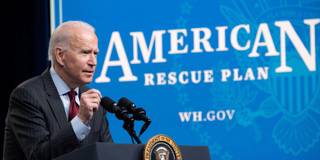The coronavirus pandemic has sparked a rebirth of Keynesianism and the welfare state in Western Europe, Japan, Canada, and parts of Latin America, and changed the terms of US debate in ways that previously seemed almost unthinkable. Three examples show how the narrative is changing.
MEXICO CITY – With the United States beset by the COVID-19 pandemic, a deep economic recession, and heightened racial tensions, many observers predicted – some in hope, others resignedly – that the 2020 elections would bring about a significant change in the country’s social contract. Fortunately, they appear to have been right. Proposals to strengthen the welfare state and social safety nets have gone mainstream – and not only in America.
I argued back in May 2019 that America was ready for a more robust welfare state. And well before the pandemic began, the platforms and promises of many of the Democratic presidential candidates – including Elizabeth Warren and Bernie Sanders on the party’s left, centrists such as Joe Biden and Andrew Yang, and Michael Bloomberg on the right – suggested a marked shift to the left on many issues.
They advocated universal health care and childcare, free public higher education, and higher pensions and unemployment payments. A $15-per-hour minimum wage, non-property wealth taxes, universal basic income, and child support were on the agenda, too. Several candidates also pledged to fight systemic racism in housing and the justice system, introduce a Green New Deal, and even guarantee a federal government job to anyone who sought one.

MEXICO CITY – With the United States beset by the COVID-19 pandemic, a deep economic recession, and heightened racial tensions, many observers predicted – some in hope, others resignedly – that the 2020 elections would bring about a significant change in the country’s social contract. Fortunately, they appear to have been right. Proposals to strengthen the welfare state and social safety nets have gone mainstream – and not only in America.
I argued back in May 2019 that America was ready for a more robust welfare state. And well before the pandemic began, the platforms and promises of many of the Democratic presidential candidates – including Elizabeth Warren and Bernie Sanders on the party’s left, centrists such as Joe Biden and Andrew Yang, and Michael Bloomberg on the right – suggested a marked shift to the left on many issues.
They advocated universal health care and childcare, free public higher education, and higher pensions and unemployment payments. A $15-per-hour minimum wage, non-property wealth taxes, universal basic income, and child support were on the agenda, too. Several candidates also pledged to fight systemic racism in housing and the justice system, introduce a Green New Deal, and even guarantee a federal government job to anyone who sought one.